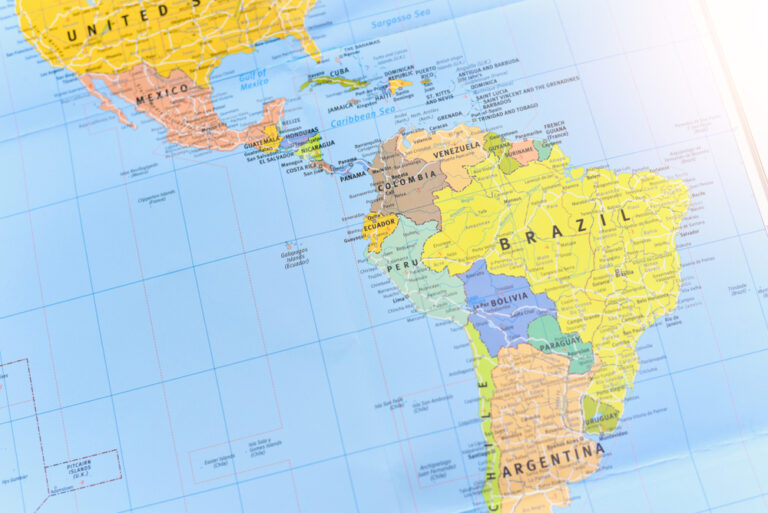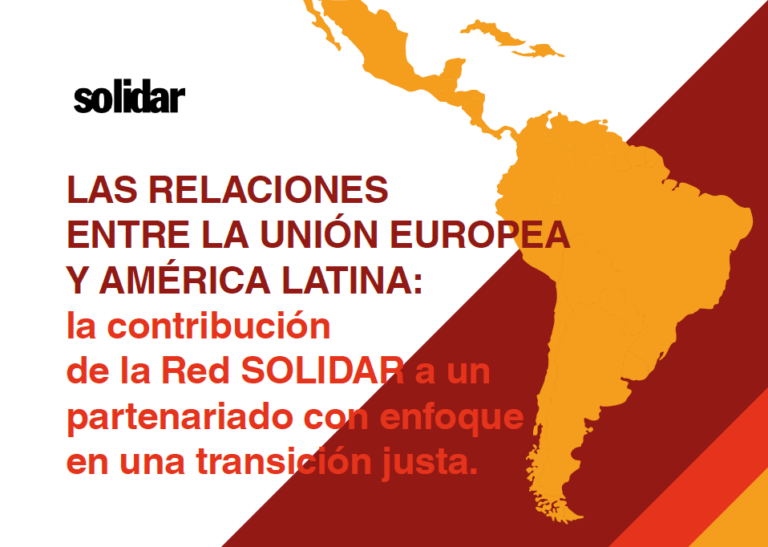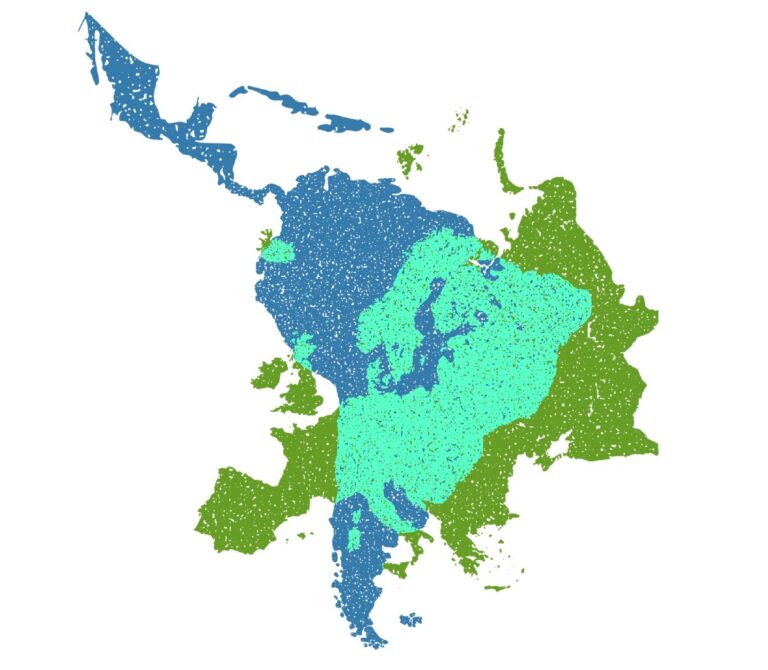EU-CELAC Summit: a Real Renewed Political Partnership?
The 3rd European Union (EU) and Community of Latin American and Caribbean States (CELAC) Summit took place on 17th and 18th of July in Brussels. Before and during the Summit, civil society organisations from Europe and Latin America came together to present their views about what a renewed political partnership between the two regions should look like as reflected in the EU-LAC Working Group’s Joint Position Paper.
On 13th and 14th July, the European Commission, DG International Partnership (INTPA) and the European External Action Service (EEAS) organised the EU-Latin America and the Caribbean Forum: Partners in Change. SOLIDAR moderated the panel discussion on “Inequalities” where Civil Society Organisations (CSOs), Trade unions and Local Authorities representatives recommended to
- The Head of States and Governments to fulfil their international commitments to reduce informality and precarious work, promote decent work and provide social protection for all.
- The EU to establish a compromise to a social transition in the EU-CELAC Agreement that places the fight against inequalities at its core and to incorporate spillover analysis to the EU policies towards LAC (i.e. Global Gateway) and ensure policy coherence for development.
Moreover, through its member Red de Mujeres Sin Fronteras, SOLIDAR participated in a panel on “How to address the needs and rights of migrants and displaced populations in LAC and in the EU” reiterating the call for ensuring the respect of migrant people’s fundamental rights against their criminalisation. The closing session of the Forum reflected the EU-LAC Working Group Joint Position Paper and the rich discussions that took place, despite the lack of time and the absence of many CSOs representatives that were not invited to join the Forum. Unfortunately, the Head of States and Governments did not find any space in their Summit’s agenda to meet CSOs representatives.
17th and 18th of July was the time for CSOs led events parallel to the Summit to look at
- The need for a radical change in EU Trade policy and agreements with Mercosur, Mexico and Chile as these agreements are part of an out-dated model of trade that has failed people and the planet. Instead of more competition, more cooperation between the two regions is needed to confront the major challenges of our times: climate crisis, massive biodiversity loss, growing poverty, unemployment, hunger and escalating geopolitical conflicts.
- How to “Building a Just Transition to a Sustainable Future in Latin America: Civil Society Conference Parallel to the EU-CELAC Summit”co-organized by SOLIDAR, the EEB, Oxfam and other CSOs. During the event Verónica Sajbin Velásquez from MDPL Guatemala highlighted that “recognizing the knowledge of indigenous women for their own wellbeing and wellbeing of the whole society, is fundamental for a Transition to be Just, feminist and for the people”.
- An alternative model of development, cooperation and integration that is more just, supportive and sustainable, starting from shared experiences of struggle and resistance and strengthening ties between popular movements during the Cumbre de los Pueblos.
How much of the CSOs’ views and recommendations were taken on board by the EU-CELAC Summit Final Declaration of the EU-CELAC Summit 2023?
SOLIDAR prepared the check-list below to see how far our demands have been taken on board:
| Civil Society Demands** | Has it been taken up in the Summit Declaration? (Yes, No or Poorly) |
| 1. Multi-stakeholder structure for participation, contribution, and follow-up to EU-CELAC processes. | No |
| Comment: The text does not include any agreement on the set up of a multi stakeholder mechanism, instead there is only a reference to the establishment of a “consultative coordination instance between the EU and CELAC” “to ensure continuity and follow-up between high-level meetings, prepare and organise EU-CELAC Meetings of Foreign Affairs Ministers.” (paragraph 41). | |
| 2. Open civic space for a vibrant democracy. | Poorly |
| Comment: While the space for CS is being shrinking in many LAC countries, the text makes no commitment to open civic space. A quick reference is made to the respect of human rights defenders’ rights (paragraph 9) while it is acknowledged “the importance of ensuring universality, objectivity and non-selectivity in the consideration of human rights issues, and the elimination of double standards and politicization”. (paragraph 8) | |
| 3. An EU-LAC agenda that puts the fight against inequalities at its centre. | Poorly |
| Comment: While poverty and inequalities are on the rise, the text contains a light commitment to fight multiple and intersective forms of discrimination (paragraph 9). | |
| 4. Green and Just Transition for both regions. | Poorly |
| Comment: Just Transition requires 1. Financial resources, through: Debt cancellation efforts; Progressive taxation; Anti-Tax evasion and avoidance programmes; Fossil fuel subsidies phase out. 2. Universal social protection; 3. Quality public services; 4. Stringent Due Diligence.In the framework of strengthening the multilateral system, the text expresses the ambition to enhance cooperation and coordination in “human rights, labour rights, climate change and biodiversity loss, food and energy security […] taxation.” (paragraph 17); it refers to “external indebtedness and debt sustainability” and recognises “the need to use criteria beyond GDP, and … that no country has to choose between fighting poverty and protecting the planet” (paragraph 18). On Climate Change, there is an engagement of cooperation “to mitigate the adverse effects of climate change and environmental degradation, according to the principle of equity and common but differentiated responsibilities and respective capabilities, in the light of different national circumstances” (paragraph 3). | |
| 5. Just and sustainable investment and trade agreements. | Poorly |
| Comment: The text reaffirms the willingness to “Further strengthen and develop trade and investment relations between the EU and CELAC countries and regions.” and to “achieving closer integration in clean energy supply chains, including critical raw materials and technology transfer” (paragraph 31). Policy Coherence is not mentioned, nor the need to include binding sustainable development chapters in trade agreements. | |
| 6. The promotion of decent work and respect for international labour standards. | Poorly |
| Comment: Precarious jobs and poverty at work are increasing. The text commits to promote “fundamental labour principles and rights and ILO core labour standards and conventions of decent work for all” (paragraph 9) and in the framework of strengthened multilateral system, “to enhance cooperation in … labour rights” (paragraph 17). | |
While no much and not enough of the CSOs demands have been taken on board by the Head of States and Governments, yet, SOLIDAR welcomes the re-establishment of the bi-annual EU-CELAC Summit as well as the EU-CELAC Roadmap 2023 to 2025 as this will give continuity to the bi-regional relations. Together with the EU-LAC Working Group and other allies, SOLIDAR will keep working to ensure a stronger space for CSOs in the next Summit that will take place in 2025 for a Real Renewed Political Partnership.
* The EU-LAC Working Group is an informal platform of European organisations and networks created in 2014. Its common objective is to work on EU-LAC topics. SOLIDAR is an active member of the Group together with some of its members.
** Civil society demands come from the EU-LAC Civil Society Working Group’s Joint Position Paper ‘Latin America and the Caribbean and the European Union: towards a renewed and real political partnership. Proposals from civil society to strengthen the bi-regional relationship’ as well as SOLIDAR’s Narrative on EU-LAC Relations.





